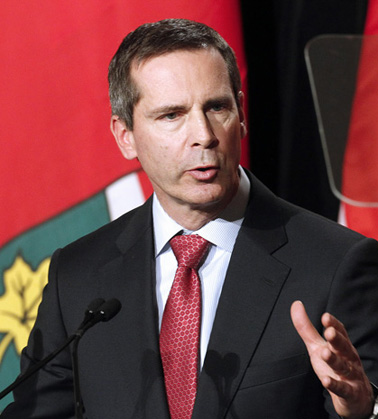Is Liberal Conservative détente next big thing in Ontariario .. and will it work?
May 7th, 2012 | By Randall White | Category: In Brief [UPDATED MAY 8]. In this past Saturday’s Toronto Star Queen’s Park columnist Martin Regg Cohn predicted that the current “feel-good political chemistry between [Liberal minority Premier] Dalton [McGuinty] and [NDP leader] Andrea [Horwath] will prove short-lived.” A week is a long time in politics, etc. And despite the recent Dalton-Andrea budget deal: “Their parties are on an unavoidable collision course on labour issues.”
[UPDATED MAY 8]. In this past Saturday’s Toronto Star Queen’s Park columnist Martin Regg Cohn predicted that the current “feel-good political chemistry between [Liberal minority Premier] Dalton [McGuinty] and [NDP leader] Andrea [Horwath] will prove short-lived.” A week is a long time in politics, etc. And despite the recent Dalton-Andrea budget deal: “Their parties are on an unavoidable collision course on labour issues.”
Regg Cohn goes on: “As labour tensions dominate the agenda, Liberals and New Democrats will grow apart – and the Tories will be in closer alignment with McGuinty’s stated goal of a two-year wage freeze for teachers’ unions and other public sector workers … Can McGuinty and [Conservative leader Tim] Hudak recast their strained relationship? … Détente may come sooner than anyone expects.”
 Similarly: “Negotiations with the province’s 128,000 teachers are going poorly, increasing the likelihood that McGuinty will legislate a wage freeze … [Conservative leader Tim] Hudak says it’s long overdue, and he’s willing to co-operate – if McGuinty reaches out ahead of time … McGuinty muses that in a minority, he draws inspiration from imperial Britain: ‘She had no permanent enemies and no permanent allies – only permanent interests.’”
Similarly: “Negotiations with the province’s 128,000 teachers are going poorly, increasing the likelihood that McGuinty will legislate a wage freeze … [Conservative leader Tim] Hudak says it’s long overdue, and he’s willing to co-operate – if McGuinty reaches out ahead of time … McGuinty muses that in a minority, he draws inspiration from imperial Britain: ‘She had no permanent enemies and no permanent allies – only permanent interests.’”
This kind of Liberal-Conservative détente in Ontario doesn’t seem altogether inevitable. It wasn’t that long ago, eg, that Regg Cohn’s fellow Toronto Star columnist Thomas Walkom was arguing : “‘Turncoat’ Rae a trailblazer for Horwath’s non-labour NDP … Under Horwath, the Ontario NDP has become more business friendly … More to the point, the party that was founded in partnership with organized labour no longer makes any pretense of being a labour party.”
 At the same time, still influential factions inside the Ontario New Democrats are uncomfortable with “Horwath’s non-labour NDP.” Ontario Federation of Labour president (and NDP activist) Sid Ryan led a big rally against the Ontario budget at Queen’s Park just over two weeks ago.
At the same time, still influential factions inside the Ontario New Democrats are uncomfortable with “Horwath’s non-labour NDP.” Ontario Federation of Labour president (and NDP activist) Sid Ryan led a big rally against the Ontario budget at Queen’s Park just over two weeks ago.
Premier McGuinty’s appointment of Conservative MPP Elizabeth Witmer to the Workplace Safety and Insurance Board (paving the way for a Kitchener-Waterloo by-election that just might give the Liberals the narrowest of majority governments at last) has been criticized by Ms Horwath herself (to say nothing of Mr. Hudak). And the premier’s allusion to his “inspiration from imperial Britain” which “had no permanent enemies and no permanent allies – only permanent interests” is certainly provocative.
 Yet a recent report on the stormy domestic politics in today’s non-imperial Britain raises some poignant questions about how wise Liberal-Conservative détente in Ontario might be – just from the standpoint of the Ontario Liberal Party’s narrowest self-interest beyond the shortest of short runs?
Yet a recent report on the stormy domestic politics in today’s non-imperial Britain raises some poignant questions about how wise Liberal-Conservative détente in Ontario might be – just from the standpoint of the Ontario Liberal Party’s narrowest self-interest beyond the shortest of short runs?
In “ Call that a coalition? … Ross McKibbin on the hopelessness of the Lib Dems,” in the April 5 issue of the London Review of Books, one of the UK’s leading political analysts explains in some painful detail why the Conservative-Liberal Democratic coalition governing Britain right now is just not working out at all for the Liberal Democrats (the closest thing the UK has to the Liberals in Canada). “It is possible,” McKibbin writes, “that in three years’ time the electorate will look more kindly on” the Liberal Democrats. But “as things stand” if an election were held today they would “be lucky to win a seat.”
 Things are different of course in Canada, and perhaps especially in Canada’s most populous province, in many different ways. And it is certainly true that Bill Davis navigated his Ontario Conservative minority governments of the mid to late 1970s and early 1980s by leaning sometimes on the opposition Liberals and sometimes on the New Democrats.
Things are different of course in Canada, and perhaps especially in Canada’s most populous province, in many different ways. And it is certainly true that Bill Davis navigated his Ontario Conservative minority governments of the mid to late 1970s and early 1980s by leaning sometimes on the opposition Liberals and sometimes on the New Democrats.
But things in Ontario have changed a lot since the golden age of Bill Davis from Brampton. There are more than a few reasons for thinking that the fate of Nick Clegg’s Liberal Democrats in the old Mother of Parliaments across the ocean could be the more apt precedent for Ontario in 2012. Hopefully, for their own good, Premier McGuinty’s advisors will be pondering these reasons carefully, before he rushes too precipitously into the arms of Mr. Hudak – and hands a few too many keys to the regional tradition of progress over to Andrea Horwath, all by herself.
UPDATE MAY 8: Premier McGuinty’s rush may or may not be too precipitous, but he is rushing. See “Dalton McGuinty reaches out to Tim Hudak for support on public sector wage freeze” in today’s Toronto Star.


Once Andrea Horwath and the NDP MPPs approved the Liberal budget, she and the party lost power. While the NDP still has a share of authority in the Ontario leglislature, it has no power to stop any agreement by the Liberals and Conservatives. Two weekends ago when Ms. Horwath was at the Ontario labour protest at Queen’s Park, she talked about supporting labour in its stuggles with the government. She didn’t mention that her upcoming approval of the Liberal budget meant that she and the NDP were in de-facto supporting the Liberal government in its stuggles with labour.
Do the teachers’ unions need the NDP to support them in teacher contract talks with the government? No. Even if the NDP does support the teachers, the party will have no power to stop the Liberals and Conservatives from imposing back-to-work legislation and a contract on the teachers. The only party the will effectively throw a wrench into the Liberal proposed salary-freeze will be the Conservatives who may state that Liberal leader Dalton McGuinty will need to clean up his own mess and not rely on the Conservatives for support.
Would an impose contract on the teachers make the teaching and learning situations normal? I don’t think so. Do expect some form of work-to-rule to take place even after an imposed contract. Expect teachers to withdraw from extra-curricular activities for at least two years. Also, teachers may refuse to attend meetings beyond the actual school day. As for professional development, don’t expect teachers to contribute with their own ideas. It’s already happening in BC. Do not expect teachers to act as principal-designates if the principal (and vice principal) need to leave the school on official business. Teachers do not perform non-union managerial duties. Don’t expect teachers to hand out non-official notices to students. Scholastic forms? Forget it. Finally, some teachers may choose to retire. The unions could place a “pink notice” on teacher applicants telling them not to apply for teaching positions. Anyone who does and accepts a teaching position will not receive the support of the unions. Those new teachers may be ostricized by their union and its members.